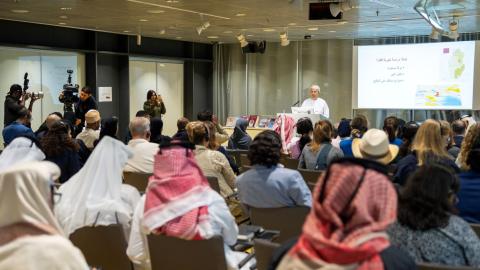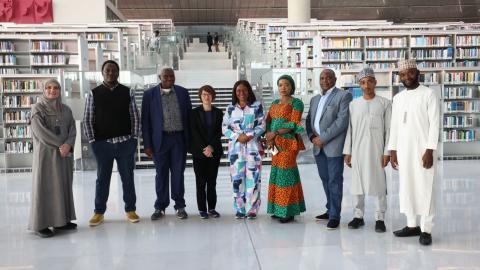
Qatar National Library (QNL), a member of Qatar Foundation for Education, Science and Community Development (QF), in collaboration with the Embassy of Georgia in Qatar inaugurated an exhibition to showcase the history of the Muslim civilization that existed across a vast region ranging from Turkey, Persia, and Georgia to Samarqand, the modern day Uzbekistan.
Hosted by Katara Cultural Village and open to the public from 18 – 31 October, the exhibition, Writing Cultures – Manuscripts from Georgia – features enlarged reproductions of outstanding manuscripts dating from the 10th to the early 20th century AD.
Through this exhibition, QNL supports QF’s mission to unlock human potential and preserve the culture and heritage of Qatar and the wider region. QNL does this by spreading knowledge, nurturing imagination, cultivating creativity, and preserving the nation’s Heritage for the Future.
The manuscripts offer a longitudinal view of Arabic and Georgian works in various branches of knowledge. They range from 10th century Quran fragments, theological commentaries, and medieval illuminated gospel manuscripts to juridical treatises in Arabic and legal deeds issued by Georgian kings.
The works encompass 19th and 20th century Caucasian historiography written in Arabic, at the time still a lingua franca among the learned in the Northern Caucasus. Literature and poetry writings are on display, including the important epic Knight in the Panther’s Skin by Georgia’s great 12th century poet Shota Rustaveli.
In medicine, Avicenna’s Canon of Medicine, widely in use in Europe until the 16th century, is shown along the Book of Healing by Zaza Panaskerteli, a Georgian 15th century scholar whose work relates to Georgia’s own Greco-Roman heritage.
Hosted by Katara Cultural Village and open to the public from 18 – 31 October, the exhibition, Writing Cultures – Manuscripts from Georgia – features enlarged reproductions of outstanding manuscripts dating from the 10th to the early 20th century AD.
Through this exhibition, QNL supports QF’s mission to unlock human potential and preserve the culture and heritage of Qatar and the wider region. QNL does this by spreading knowledge, nurturing imagination, cultivating creativity, and preserving the nation’s Heritage for the Future.
The manuscripts offer a longitudinal view of Arabic and Georgian works in various branches of knowledge. They range from 10th century Quran fragments, theological commentaries, and medieval illuminated gospel manuscripts to juridical treatises in Arabic and legal deeds issued by Georgian kings.
The works encompass 19th and 20th century Caucasian historiography written in Arabic, at the time still a lingua franca among the learned in the Northern Caucasus. Literature and poetry writings are on display, including the important epic Knight in the Panther’s Skin by Georgia’s great 12th century poet Shota Rustaveli.
In medicine, Avicenna’s Canon of Medicine, widely in use in Europe until the 16th century, is shown along the Book of Healing by Zaza Panaskerteli, a Georgian 15th century scholar whose work relates to Georgia’s own Greco-Roman heritage.



